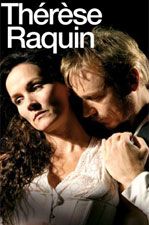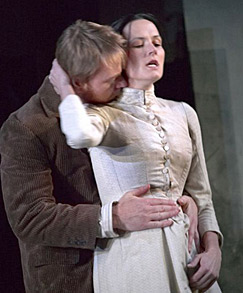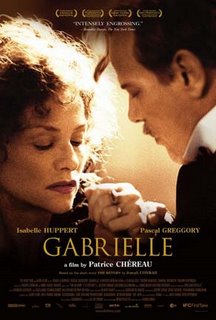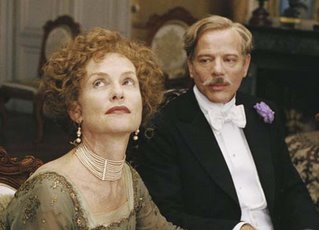First, a matinee of the National Theatre's THERESE RAQUIN at the Lyttleton. I was in two
 minds about seeing this recently-opened production: on the one hand the Zola novel is one of my favourite books and I have also seen a bad stage version in 1993 at the Young Vic. However this is directed by Marianne Elliott whose PILLERS OF THE COMMUNITY was such a success in the same theatre earlier in the year, the production is based on Zola's own stage adaptation and in the cast are a couple of favourite performers, Ben Daniels and Judy Parfitt.
minds about seeing this recently-opened production: on the one hand the Zola novel is one of my favourite books and I have also seen a bad stage version in 1993 at the Young Vic. However this is directed by Marianne Elliott whose PILLERS OF THE COMMUNITY was such a success in the same theatre earlier in the year, the production is based on Zola's own stage adaptation and in the cast are a couple of favourite performers, Ben Daniels and Judy Parfitt.Therese (Charlotte Emerson) is married to sickly Camille (Patrick Kennedy) and they live with his fussing mother (Parfitt) above a shop in a dark arcade in Paris. She is secretly having a passionate relationship with Camille's boyhood friend Laurent (Daniels). Therese and Camille's frustrated passions are at boiling point when a chance remark from one of the husband's friends about how quite a few murderers go unpunished sparks them into action, drowning Camille on a weekend visit to the country. A year later Laurent engineers Camille's grieving mother and friends into agreeing that Camille's supposed dying wish for Laurent to protect his wife should come true. Laurent marries Therese but by now the couple are being eaten away by the guilt of what they have done. Sleepless nights are endured and Laurent is haunted by the sight of Camille's eight day-old corpse in the morgue. Their bitter recriminations are overheard by Mme Raquin who suffers a heart attack and is left speechless and paralysed, staring at them both day and night. For them there can only be one escape...
As much as I admired Elliot's clear and direct approach to the production there seemed several problems. Sadly Zola probably wasn't the best person to adapt his novel as so much of what
 makes the novel great is lost in this pared-down version, the drowning of Camille occurs between acts and gone is the frightening vision of the morgue. With so much of the inner voice missing Therese is reduced to spending half the play staring into space - and Charlotte Emerson can do nothing to make her watchable during this. There are two actresses who are called on for these dramatic roles these days - if you want obsessed-without-shagging you get Eve Best; if you want obsessed-with-shagging you get Charlotte Emerson... BABY DOLL, THE POSTMAN ALWAYS RINGS TWICE and now THERESE RAQUIN. Rarely has such an underwhelming actress been cast as such ripe broads. Ben Daniels is always watchable but while he was totally believable as a man being haunted by ghosts he didn't strike many bells as the impassioned lover. With the two leads mis-firing in the passion stakes one looks to the supporting cast for inspiration, Patrick Kennedy made a good impression as the doomed Camille, Judy Parfitt was fine as his doting mother and Mark Hadfield stole most of the scenes as the toe-curling M. Grivet, the tedious friend of Camille who visits every Thursday to play dominos. The production values helped, Neil Austin's subtle lighting and the ominous soundscape by Christopher Shutt kept the tension going in the second half. Hildegard Bechtler's set is like the production itself - effective but slightly off. A large drab corner of the rooms above the Raquin shop it conjures up the interiors of Degas and Sickert but hardly squares with the frequent references in the text to being a cramped space as it fills the vast Lyttleton stage and the vital feeling of the lovers caught in a claustrophobic prison is lost. I think the production would have faired better in the Cottesloe.
makes the novel great is lost in this pared-down version, the drowning of Camille occurs between acts and gone is the frightening vision of the morgue. With so much of the inner voice missing Therese is reduced to spending half the play staring into space - and Charlotte Emerson can do nothing to make her watchable during this. There are two actresses who are called on for these dramatic roles these days - if you want obsessed-without-shagging you get Eve Best; if you want obsessed-with-shagging you get Charlotte Emerson... BABY DOLL, THE POSTMAN ALWAYS RINGS TWICE and now THERESE RAQUIN. Rarely has such an underwhelming actress been cast as such ripe broads. Ben Daniels is always watchable but while he was totally believable as a man being haunted by ghosts he didn't strike many bells as the impassioned lover. With the two leads mis-firing in the passion stakes one looks to the supporting cast for inspiration, Patrick Kennedy made a good impression as the doomed Camille, Judy Parfitt was fine as his doting mother and Mark Hadfield stole most of the scenes as the toe-curling M. Grivet, the tedious friend of Camille who visits every Thursday to play dominos. The production values helped, Neil Austin's subtle lighting and the ominous soundscape by Christopher Shutt kept the tension going in the second half. Hildegard Bechtler's set is like the production itself - effective but slightly off. A large drab corner of the rooms above the Raquin shop it conjures up the interiors of Degas and Sickert but hardly squares with the frequent references in the text to being a cramped space as it fills the vast Lyttleton stage and the vital feeling of the lovers caught in a claustrophobic prison is lost. I think the production would have faired better in the Cottesloe. After that it was up to the Curzon Soho for more marital misery, Patrice Chereau's new film GABRIELLE. Based on a Joseph Conrad novella written in 1898 it starts with Jean (Pascal Greggory) walking home from a train journey. He speaks in voiceover about his life as a successful publisher and how with his graceful and cultivated wife Gabrielle (Isabelle Huppert) he now plays an active social life, delighting in the knowledge that more than 50 of the most well-to-do couples are eager to be invited to their soirees. He boasts of his business acumen in managing to keep a newspaper he bought afloat despite his dislike of the editor and how he leads a life that many would envy. On arriving home he finds a letter on his desk from Gabrielle.... a Dear Jean letter. Completely thrown by this bolt from the blue, he is further bewildered by Gabrielle's return a few hours later. When he interrogates her she simply replies that she made a mistake. Later in a conversation with her maid she admits that after ten years of a soulless marriage she found herself infatuated with another man and that you must try and grasp the few moments of true happiness when you can. At the delayed evening meal Jean further berates an impassive Gabrielle until he tells her that after much consideration, he will forgive her. Gabrielle's hysterical laughter at this is proof that nothing will ever be the same again in their presumed ordered existance and, when the identity of the lover is revealed to be the editor of the newspaper, the marriage disintergrates further into one of emotional and physical rejection.
After that it was up to the Curzon Soho for more marital misery, Patrice Chereau's new film GABRIELLE. Based on a Joseph Conrad novella written in 1898 it starts with Jean (Pascal Greggory) walking home from a train journey. He speaks in voiceover about his life as a successful publisher and how with his graceful and cultivated wife Gabrielle (Isabelle Huppert) he now plays an active social life, delighting in the knowledge that more than 50 of the most well-to-do couples are eager to be invited to their soirees. He boasts of his business acumen in managing to keep a newspaper he bought afloat despite his dislike of the editor and how he leads a life that many would envy. On arriving home he finds a letter on his desk from Gabrielle.... a Dear Jean letter. Completely thrown by this bolt from the blue, he is further bewildered by Gabrielle's return a few hours later. When he interrogates her she simply replies that she made a mistake. Later in a conversation with her maid she admits that after ten years of a soulless marriage she found herself infatuated with another man and that you must try and grasp the few moments of true happiness when you can. At the delayed evening meal Jean further berates an impassive Gabrielle until he tells her that after much consideration, he will forgive her. Gabrielle's hysterical laughter at this is proof that nothing will ever be the same again in their presumed ordered existance and, when the identity of the lover is revealed to be the editor of the newspaper, the marriage disintergrates further into one of emotional and physical rejection. Although it is never stated as to what went wrong with her escape - although the
 editor is seen at a dinner party ruefully saying that some promises should never be carried out - Gabrielle's sadness at having to return to the cage she had fled from is palpable but that hurt is chilled into cold indifference, her detached and baleful stares shrivelling the husband to nothing until all he can do is to rape her in an attempt to establish his authority. This leads to a final scene of cold capitulation from Gabrielle which destroys Jean totally. Isabelle Huppert is a past mistress of these films of emotional devastation and she delivers another memorable performance to add to her gallery of women whose sexuality is trapped by circumstance.
editor is seen at a dinner party ruefully saying that some promises should never be carried out - Gabrielle's sadness at having to return to the cage she had fled from is palpable but that hurt is chilled into cold indifference, her detached and baleful stares shrivelling the husband to nothing until all he can do is to rape her in an attempt to establish his authority. This leads to a final scene of cold capitulation from Gabrielle which destroys Jean totally. Isabelle Huppert is a past mistress of these films of emotional devastation and she delivers another memorable performance to add to her gallery of women whose sexuality is trapped by circumstance.The novella is written totally from the husband's perspective and so carrying the majority of screen time Greggory has the tougher role in that Jean is such a selfish prig it is hard to feel any sympathy for him when his life implodes and I felt he didn't altogether succeed in making the character at all interesting. The film itself is compromised too by Chereau's intrusive stylistic conceits - I didn't mind the film changing from black & white to colour several times but the freezing of the frame occasionally to superimpose the words just spoken on the screen was jarring and the heavily orchestrated score constantly playing against the mood of the scene was plain annoying. At one point the score was so doom-laden with swelling strings I expected Gabrielle to bump into Hannibal Lechter, Norman Bates and Freddy Krueger in the darkened hall. The cinemagraphy is excellent and although the production design is fine too, the idea to possibly suggest the emptiness of the couple's life by having them live in a huge mausoleum of a building is laughable; in some scenes it looks like they resided in one of the sculpture rooms of the V&A.
2 comments:
You are right about Mark Hadfield. He is a superb actor who is compellingly coonvincing in any role he plays. An absolute dream for anyone casting. Brilliant as ever in Therese Racquin
What a fun afternoon you had ...
Post a Comment